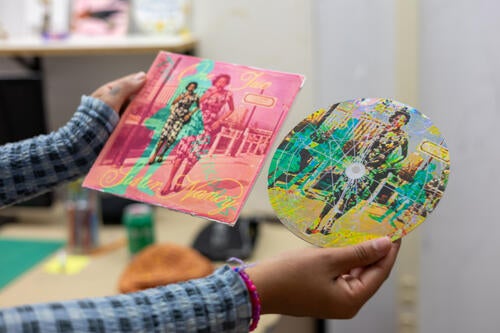
Recomposing music and identity
MFA student's journey through art and activism highlights Black innovation, resiliency, and joy

MFA student's journey through art and activism highlights Black innovation, resiliency, and joy
By Zoe Tipper Faculty of ArtsAs a multi-disciplinary artist, Charlie Star expresses her Afro-Caribbean heritage through innovative media and reshaping existing materials. Centering her graduate work on the influence of music on socio-political injustices, Star uses astrology as a tool for analysis and her personal heritage as the framework. "I look for instances where music has been expressed as - and instigated - social movements. Highlighting expressions from the past can give perspective on our present circumstances."
As a bi-racial woman living at the intersection of two cultures, French-Canadian and West Indian, she draws upon her unique experiences and perspectives to inform her work. Working primarily with audio and visual collages, Star's diverse pieces explore the themes of colonial and imperial resistance found within reggae, ska, rocksteady, dub, and dancehall.
Born on the island of St. Martin in the Caribbean, Star moved to southwestern Ontario as a child, where she had limited exposure to Caribbean culture. Upon returning to her birthplace in 2013, Star decided to incorporate more of her Caribbean roots into her daily life, leading to a DJ project that focused on female-fronted reggae acts. This experience sparked her interest in recomposing music, which has now become a central part of her research and art.

Star’s work extends beyond the traditional confines of an art studio as she combines astrology, history, and culture in her art. In everything she does, Star considers her positionality - which she defines as where she comes from, and the privileges and obstacles she encounters in society. The complexities of her own bi-racial experience, moving between different cultural spaces, deeply inform this perspective. As an academic and researcher, Star says that she reflects on her lived experience to inform her motivations and to remain integral to ethical and equitable exchanges in her communities.
Though there is a tendency in Black history to focus on disparities and injustices, Star's work highlights Black innovation, resiliency, and joy. She aims to illuminate how music can serve as more than mere entertainment and hopes her pieces will inspire others while drawing attention to important issues. "Everyone might interpret my work differently, depending on their positionality and how they process information,” she shares. “Moreover, I think people’s bias of how Black life is expressed could also lead to misconceptions of my work, because the way I engage with and express my Black culture doesn’t fit mainstream stereotypes."
On pursuing graduate studies, Star says, "I wanted to expand and elevate my practice to open more opportunities in the sector that I love working in, while building my capacity to address racism, violence, systemic bias and other acts of intolerance in my communities, through a creative, arts-based lens." At the University of Waterloo, Star found an environment that perfectly complements her love for teaching, making art, and creating connections across disciplines. "There are lots of opportunities to connect with people and courses outside of my department and that contributes to my value for intellectual diversity," she says.
This summer, Star will be working in New York City at Harvestworks, a not-for-profit digital media art centre, where she will be assisting exhibiting artists with performance production. Looking ahead after graduation, she aspires to teach art-based studio courses at the post-secondary level. With a deep passion for her work and a commitment to intellectual diversity, Charlie Star is poised to make significant contributions to the art world and academia, fostering an understanding of Black life that transcends mainstream stereotypes.

Read more
New executive program with Waterloo Region Health Network helps health care executives navigate ongoing AI transformation

Read more
Researchers awarded funding to investigate ecology, climate change, repatriation, health and well-being through cultural and historical lens

Read more
Professor launches Canada’s first large-scale VR use in the classroom, embracing emerging technology and driving the future of education
The University of Waterloo acknowledges that much of our work takes place on the traditional territory of the Neutral, Anishinaabeg, and Haudenosaunee peoples. Our main campus is situated on the Haldimand Tract, the land granted to the Six Nations that includes six miles on each side of the Grand River. Our active work toward reconciliation takes place across our campuses through research, learning, teaching, and community building, and is co-ordinated within the Office of Indigenous Relations.